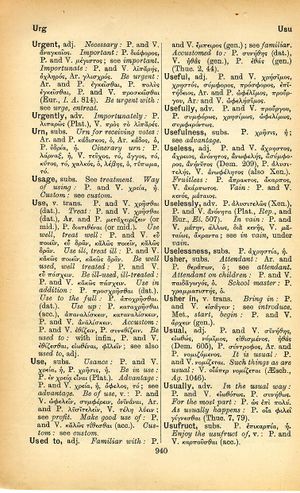use
Μέμνησο πλουτῶν τοὺς πένητας ὠφελεῖν → Memento dives facere pauperibus bene → Vergiss nicht, dass als Reicher du den Armen hilfst
English > Greek (Woodhouse)
v. trans.
P. and V. χρῆσθαι (dat.).
Treat: P. and V. χρῆσθαι (dat.), Ar. and P. μεταχειρίζειν (or mid.), P. διατιθέναι (or mid.).
Use well, treat well: P. and V. εὖ ποιεῖν, εὖ δρᾶν, καλῶς ποιεῖν, καλῶς δρᾶν.
Use ill, treat ill: P. and V. κακῶς ποιεῖν, κακῶς δρᾶν.
Be well used, well treated: P. and V. εὖ πάσχειν.
Be ill-used, ill-treated: P. and V. κακῶς πάσχειν.
Use in addition: P. προσχρῆσθαι (dat.).
Use to the full: P. ἀποχρῆσθαι. (dat.).
Use up: P. καταχρῆσθαι (acc.), ἀπαναλίσκειν, καταναλίσκειν, P. and V. ἀναλίσκειν.
Accustom: P. and V. ἐθίζειν, P. συνεθίζειν.
Be used to: with infin., P. and V. ἐθίζεσθαι, εἰωθέναι, φιλεῖν; see also used to, adj.
subs.
Usance: P. and V. χρεία, ἡ, P. χρῆσις, ἡ.
Be in use: P. ἐν χρείᾳ εἶναι (Plat.).
Advantage: P. and V. χρεία, ἡ, ὄφελος, τό; see advantage.
Be of use, v.: P. and V. ὠφελεῖν, συμφέρειν, ὀνινάναι, Ar. and P. λυσιτελεῖν, V. τέλη λύειν; use profit.
Make good use of: P. and V. καλῶς τίθεσθαι (acc.).
Custom: see custom.

